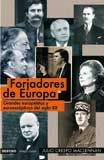


Europe Makers is a biographical essay on a selection of the most influential personalities in the construction of Europe.
Europeanism and its corollary, the European Union, is the third most important political experiment in the twentieth century, the other two are Communism and Fascism. Europeanism was a reaction to the disasters caused by these two movements. In its early stages it was an elitist movement originally conceived by visionaries like the Austrian diplomat, Richard Coudenhove-Kalergi, and put into practice by ambitious international financiers like Jean Monnet or pragmatic politicians concerned with reconciliation like Robert Schuman, Alcide de Gasperi and Paul-Henri Spaak and it has involved the most important statesmen from the post-war era to the present.
Although a lot has been written about the construction of Europe, there is not enough literature about its main protagonists. Some of the personalities selected in this book do not even have a biography despite the fact that their role in this process is crucial. On the other hand it is true that several biographies have been written about some of the statesmen examined in this book, but neither their contribution to the construction of Europe nor their continental experiences have been dealt with in sufficient depth. This book offers an original and innovative approach to the process of European integration in the form of biographical essay, from the perspective of the life and works of those who have contributed to it from diverse countries and ideologies, different mentalities and political strategies as well as those whose life and works had major influence on present Europe. Julio Crespo MacLennan, renowned expert on European politics and history, presents here the elegant, illuminating and somewhat iconoclastic profiles of twenty-four Europeanists and Eurosceptics, including unique names such as Churchill, De Gaulle, Adenauer, Ataturk, Thatcher, Gorbachev and Felipe González, portrayed from the perspective of their contribution to the idea of Europe.
The epilogue includes a reflection on the present and the future of European integration as it faces the new challenges of the twenty-first century. This essay is therefore a critical, non-complacent claim of the role of individuals in history, but always regarded as immersed in the life of their time.
Links:
[1] http://217.160.225.169/node/291
[2] mailto:cmora@planeta.es
[3] mailto:msansegundo@planeta.es
[4] http://www.edestino.es